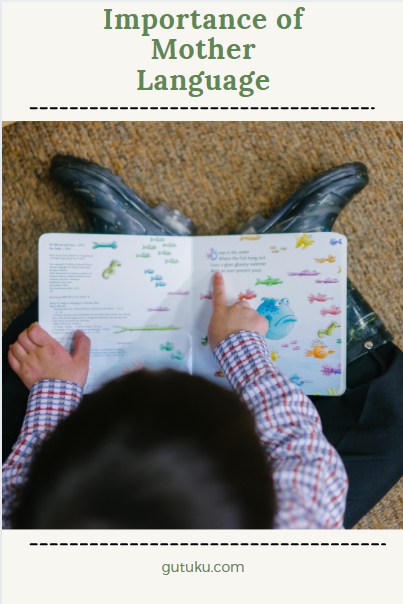With Globalization at its peak and International schools on the rise, we as a society are inclining more towards foreign languages, as a result mother tongue is taking backseat in our child’s life. Mother tongue or language is very important in shaping child’s identity, it connects them with their roots and culture. In this article let us discuss about the importance of mother tongue in child’s life.

Awareness about mother tongue
UNESCO believes that early childhood education should start with mother tongue. 21st February is declared as International Mother Language Day by UNESCO. It is observed every year to safeguard linguistic diversity and to promote multilingualism.
Of late, people are understanding the importance of preserving their mother tongue. Naturally, this awareness is transferred to education sector, rather efforts are made to give importance to mother language. One best example is NEP 2020, which has a proposal to impart education till grade 5 (preferably till grade 8) in native/mother/local language.
You may like to read our article on – 7 Important points of NEP 2020
Why Mother Language is so important and its benefits?
- Helps in literacy skill development : Babies are exposed to the mother language even before their birth. So, they can comprehend and connect with the language easily. Providing strong foundation of the mother language equips them with skills required to learn other languages.
- Improves cognitive skills : The skills developed by the child while learning the mother tongue can be transferred easily when the child starts learning 2nd language. For example – Reading between the lines to infer something, guessing the meaning of the word using the given context, etc.
- Connection with culture and heritage : Languages are interlinked to our culture and heritage. Children can truly appreciate and respect their culture only if they are proficient in their mother tongue. Having strong foundation in mother tongue makes their cultural identity stronger and gives a boost to their confidence level.
- Academic Success : Research shows that studying in mother tongue helps children to have better understanding of their curriculum. It makes it easy for the child to grasp and understand the topics. Hence supports quick learning and brings them academic success.
- Family bonding and secure feeling: If the child is studying in the medium of mother tongue, he can always reach out to parents or grant parents in time of need. Learning from parents/ grand parents/ any other elders in the family gives an opportunity for family bonding. It also gives a sense of secure feeling to the child and boosts self confidence.
- Multilingualism: Because of the rise in migration, knowing multiple languages is considered as a plus point in today’s work environment. To learn multiple languages one need to have good literacy skills and strong foundation in mother tongue.
Every parent should make sincere efforts to give their child strong foundation of the mother tongue. It not only helps to preserve the language and culture but also plays vital role in shaping the personality of the child.


